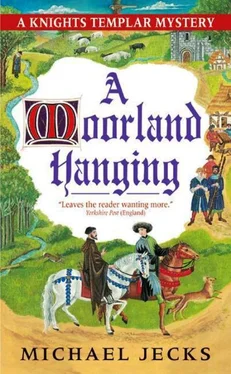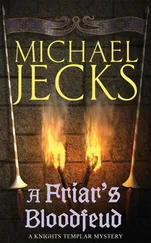The last man in the group lolloped along behind the others like a grain-filled sack, radiating discomfort and misery. He was small of stature and wore a simple short-sleeved shirt with a padded jacket. Clearly this was not a man-of-war in any sense of the word – he looked like a laborer.
Hearing a step, Ralph turned to find John peering over his shoulder.
“So the bailiff and his friend are back, then. And they’ve brought guards, too. Very sensible. You can never tell where your enemies are, can you?”
Ralph gave him a frosty smile. “We need not fear each other, anyway.”
“You think so?” John faced him. “But after your humiliation by that man…”
“Don’t be ridiculous! He was a peasant, that’s all. He was not worth my anger. And certainly not the risk of being hanged for murder. Why? You don’t think that I…”
“Perhaps. It was an embarrassment, wasn’t it? I hope that the man-at-arms who was with you does not feel it necessary to tell our friend the bailiff. That could mislead him unnecessarily.”
“The man-at-arms?” Ralph surveyed him warily.
“What can he tell?”
“Only what happened, of course. But maybe I should have a word with him and see to it that his memory is… modified. The last thing you and I need is to have any suspicions raised about either of us, after all.”
He bowed and made his way down the stairs just as the first gate was opened to welcome the visitors, and Ralph found his attention drawn to the four men entering the barbican. “Yes,” he murmured, “that’s the last thing I need – I am a stranger here. But what about you, my friend? What do you want?”
In the courtyard, the four men slowly swung from their saddles. Hugh, Simon’s servant, was the last to get down. He had always hated riding. Born and raised at the northeastern edge of Dartmoor, the second son of a farmer, he had never needed to mount a horse while a boy. Nor was there an opportunity. In the small hamlet where they had lived, they had been more or less self-sufficient, bartering with travelling merchants for any goods they could not produce themselves. It was hardly ever necessary to travel anywhere.
But since he had gone into service with Simon, Hugh had been forced to get used to regularly covering long distances. And that meant learning to ride. He hated it! Horses were far too large for a man to control, he felt, and every time he clambered up and squatted uncomfortably in the saddle he found his thoughts turning to the hardness of the ground so far below. In Simon’s service he must go up to Tiverton, east to Exeter, sometimes cross the moors to visit the stannary towns of Ashburton, Tavistock and Chagford, or make the long journey down to the coast. All were, for him, excursions of despair. During the journey, all he could think of was the pain and anguish of the trip, and even when he finally reached their destination, he could not enjoy the triumph of safe arrival: his thoughts were already bent on the agonies to come while returning home.
Today, though, he did not feel so bad. The weather had been good, so his fear of getting lost in a moorland fog was unfounded, and the warmth of the sun, and regular gulps from his wineskin, had made him almost mellow. Still, he had no wish for his master to think that he was becoming used to riding, so he maintained his glower of disgust as he released his feet from the stirrups and dropped heavily from the saddle, standing rubbing his backside with both hands.
While a lad, Hugh had been sent out with the sheep, protecting the flock from thieves on either two or four legs. Much of his suspicion of people came from those days, and now, as he turned and stared at the walls of the Manor, his face set hard. All around them men bustled, some coming to take the horses, others pulling their bags from the saddles. The pair standing and talking to his master and Sir Baldwin were, he learned, Sir William Beauscyr and his son Sir Robert. Beyond more men stood watching idly, common soldiers who could have been outlaws the week before, leaning against posts or lounging with thumbs hooked into sword-belts. To Hugh they looked like executioners gauging their prisoners, and he gave a quick shudder at the thought.
The aging knight and his son greeted Simon and Baldwin, then led the way to the hall, Hugh trailing along behind. Edgar, Baldwin’s man, kept as close to his master as a shadow.
“Sir William,” Simon said as they entered the hall, “as I understand it, Peter Bruther’s death was no accident.”
The man gave a wry smile. “No, bailiff. It was no accident.”
“Why are you so sure?” asked Baldwin.
“Because he was hanged – that’s why! Two of my men found him swinging from a tree,” he said curtly.
Simon and Baldwin exchanged a look. Both were troubled by the news, the bailiff most of all. With all the existing problems between the tinners and landowners, it only needed one small spark to start a conflagration which could engulf all the lands under his authority. This death could easily be that spark.
Sir William plainly did not hold the same fear. He was reserved but not fearful as he strode to the fireplace where his wife sat quietly stitching at a tapestry. She smiled up at him as he touched her shoulder. When she returned to her work he said, “Certainly, it’s a nuisance. But it’s a problem solved as well.” Baldwin was not surprised at his words. It would have been strange for the old knight to feel otherwise. After all, he reasoned, the death of Bruther must have been a relief to Sir William, and the man was no hypocrite.
Seating himself at a bench near the fire, Simon gazed at the old knight thoughtfully. Robert wandered to the dais and leaned back on the table, listening carefully. Simon glanced at him, then back at the knight. “Solved?” he prompted.
“Yes.” Sir William dropped heavily into a chair. “Solved. Bruther is dead. He was a sore problem to me and my family while he lived, but now he’s dead, the example he set to my peasants has been killed with him. If any other villeins had ideas about running away, they’ll think again now.”
Baldwin had seated himself beside Simon, and now leaned forward. “Do you have any idea who might have killed him?” he said. He was surprised when Matillida Beauscyr answered, her eyes on her stitching at first, but then rising to meet Baldwin’s gaze.
“Yes. He did.” Her voice carried certainty. “He killed himself as surely as if he had put the rope round his own neck.”
“I’m sorry?” said Baldwin, frowning. “How did he do that?”
“The miners hereabouts are a tough group, Sir Baldwin, and they have their own kind of justice. They rely on all tinners holding to certain principles. If a man makes a claim to some piece of land, it is his. This fool Bruther went on to a plot and began tinning there. I have no doubt you will find that he was on someone else’s land. To the tinners, that would be as good as theft. I rather expect you will find that he was trespassing and the real miners decided to punish him.”
Sir Robert frowned, unsure of her point, but then it came to him and he almost gasped. In a few short words, Matillida had put the blame firmly on to Thomas Smyth.
“You mean that he was hanged as a punishment for working on another man’s claim?” Baldwin probed.
Sir William spoke again. “Yes. We’ve no doubt about it. He was lynched by a mob.”
Simon stirred. “You’ve got his body here?”
“Yes, in an undercroft – it’s cool down there.”
“May we see him now?”
Shrugging, the knight led them back into the courtyard and up toward the kitchen area, leaving his son and wife behind. At the back of the building, near the wall closest to the river, he took them down a short stair and into a shallow, pit-like cellar. Here wine and ale barrels lined the walls, and when Hugh tapped one experimentally, it thudded dully, sounding comfortingly full. Up at the far end of the chamber was a large box; within it rested the corpse of the man who had caused so many problems to the landlord.
Читать дальше












